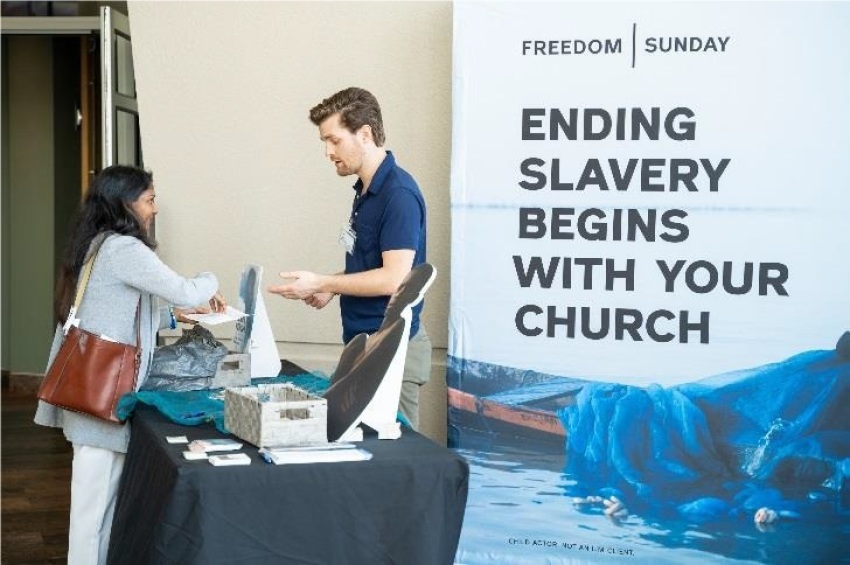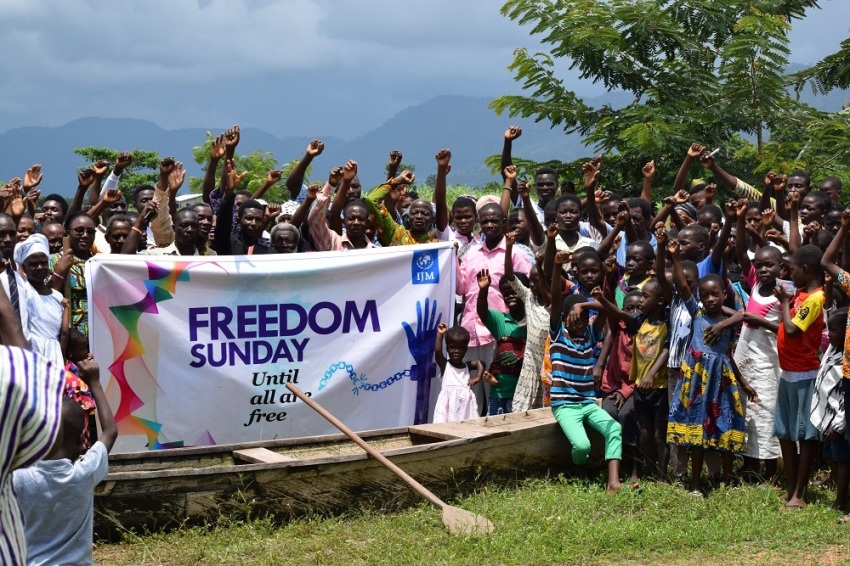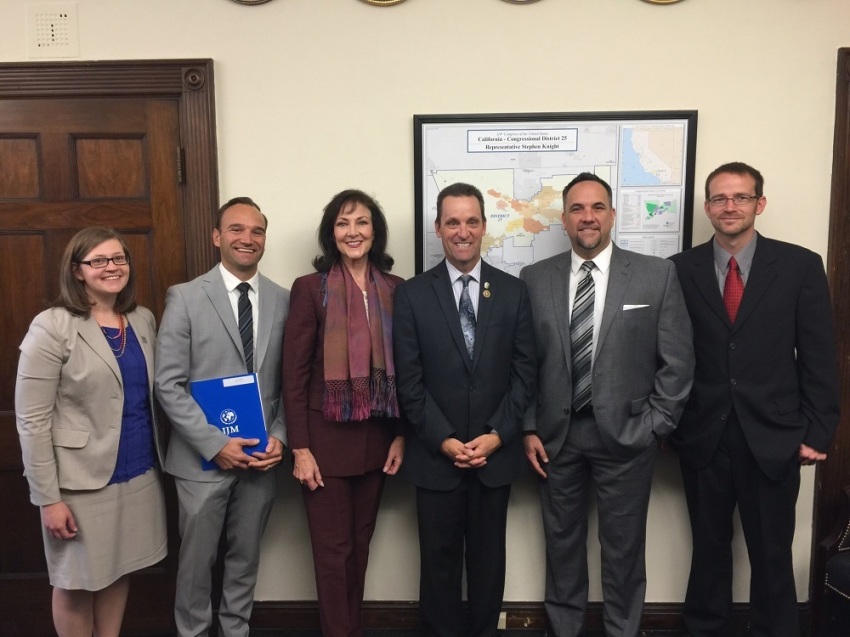‘Freedom Sunday’: Thousands of churches to raise awareness of global slavery crisis

Churches across the world this weekend will be partnering with International Justice Mission by hosting “Freedom Sunday” services to help raise awareness and inspire action in response to the millions of men, women, and children living in slavery worldwide.
Thousands of churches will take part in the fourth annual “Freedom Sunday” on Sept. 22, a day church leaders devote to speaking out about the issue in order to motivate congregants to take action so that the scourge of slavery is “ended in our lifetime.”
Congregants have not only been motivated through the years to become “freedom partners” and donate monthly to IJM — a global Christian NGO that seeks to eliminate the global slave trade — but they have also lobbied lawmakers to pass initiatives to curb the crisis.
According to the Global Slavery Index, as many as 40.3 million people — 71 percent of whom are female — are living in some form of modern-day slavery as of 2016. This includes 24.9 million people in forced labor and 15.4 million people in forced marriages.
When Freedom Sunday began in 2016, over 500 churches participated. But in just a few short years, Freedom Sunday has experienced staggering growth. As many as 18,000 churches from 52 countries participated in Freedom Sunday in 2018 and IJM is hoping to surpass that this weekend.
“IJM truly is working to create a movement to end slavery and that’s how Freedom Sunday was created,” IJM director of church mobilization Jocelyn White told The Christian Post.
“We truly believe that the end of slavery requires the action of the entire global Church. Freedom Sunday is the way that we invite churches across the globe and across denominations and across countries to join the movement of ending slavery.”
The explosive growth of Freedom Sunday in the last four years shows that the Church is “hungry for a way to share about the issue of slavery,” White contended.
“I think the fact that slavery still exists is more and more common knowledge across churches [today],” she stated. “They are just looking for a way to introduce that issue to their congregations and Freedom Sunday seems to be that perfect vehicle in which to do so.”

Freedom Sunday services are dedicated to preaching about God’s heart for justice and sharing about slavery. Each church is able to pick a region of the world from which they share a story of an IJM client who has been rescued from slavery.
“They will invite their congregation to respond by inviting them to become a freedom partner with IJM,” she said. “A freedom partner is someone who is committed to praying for our work, advocating for our clients and investing at least $24 a month. It's a great first step for people to take when they want to respond to the issue of slavery. I know it was my first step.”
“When they hear that cases are going through the justice system faster and that we're receiving more and more convictions, the Church can actually see how their advocacy impacted the work on the field,” she continued.
White said that she has met with a number of churches that have hosted Freedom Sundays but later expressed a desire to partner with IJM on a deeper level as a result of such outstanding responses from their congregations to the movement. A number of churches, she said, have pursued partnerships with IJM’s field offices.
One of those churches is the 6,500-member multi-campus Real Life Church in California. In addition to Freedom Sunday, the church has held special offerings to help the IJM field office in the Dominican Republic.
“Real Life actually came and visited our office in the Dominican Republic and they really have come to have a deep understanding of their role and how their support allows our colleagues across the Dominican Republic to advocate for our clients and walk alongside them,” White said.
Real Life members and leaders have also joined IJM in participating in global prayer gatherings in Washington, D.C. and deployed staff and volunteers to meet with their local policymakers on IJM’s behalf. Real Life members have assisted in pressing for the passage of the Global Fund to End Modern Slavery. The church has also hosted IJM speakers for special events.
Among those leading the advocacy efforts at Real Life Church is Steve Meyers, the church’s executive director of advancement.
“The response from people in our church has been awesome,” Meyers told CP. “It's one of those topics, that's really difficult to hear. And a lot of people just don't intersect with the idea of slavery. And, so when they hear it, especially for the first time, they're very shocked. And they can't believe that that's still happening around the world.”
“For us, Freedom Sunday is really a launching pad to put this in front of people throughout the year,” he continued. “Freedom Sunday gives the opportunity to take over the service and center it around issues of justice and slavery around the world and how people can engage.”
Beyond Freedom Sunday, Meyers said church members can engage throughout the year by participating in special nights where the church highlights IJM and its partnership with a local nonprofit called Saving Innocence. Additionally, church members have taken up opportunities to advocate for legislation on the table.
“It is and provides great opportunities for people to sign letters, petitions, and other ways that they can call their local politician and advocate for freedom,” he explained.

Twice, groups of about four leaders and lay members of Real Life have traveled to Washington, D.C. and met with members of Congress on IJM’s advocacy day. Meyers said that one member of Congress the group met with was Steve Knight, a Republican who formerly represented Meyers and others who live in California’s 25th congressional district.
As a result of the meeting with Knight, Meyers said that he was able to work with the congressman to put together a roundtable with church leaders and nonprofit leaders in their town to discuss the issue of trafficking.
“[W]e don't get involved politically but we felt like that this was an item that we felt like is beyond politics,” Meyers reasoned. “It's about bringing freedom and justice to people who are oppressed and around the world and didn't feel like that was a politically divisive thing because it's a bipartisan issue."
One of the most encouraging parts about Real Life’s partnership with IJM, Meyers said, is that church members are taking “their own initiative” to raise awareness and launch fundraisers on behalf of IJM.
“Different people do different things and they weren't asked to. It wasn't a staff-led thing from the church, it was just something that they had become aware of and did their own investigation online and we're like, ‘Man, let's do more,’” he detailed.
“And one group decided to start a thing called ‘Just Recycle.’ And so they got these recycle bins that had ‘Just Recycle’ on it and IJM on the side and one of the local partnerships that we have. They took those bins to different businesses and just asked them to contribute plastic bottles. All the money received is going to go to those organizations.”
Meyers stressed that he believes that the Church “really needs to engage in this issue.”
“It’s something that our country fought a civil war to end and to know that there are more slaves now than there ever has been in history, is pretty incredible,” he stated.
Follow Samuel Smith on Twitter: @IamSamSmith
or Facebook: SamuelSmithCP



























